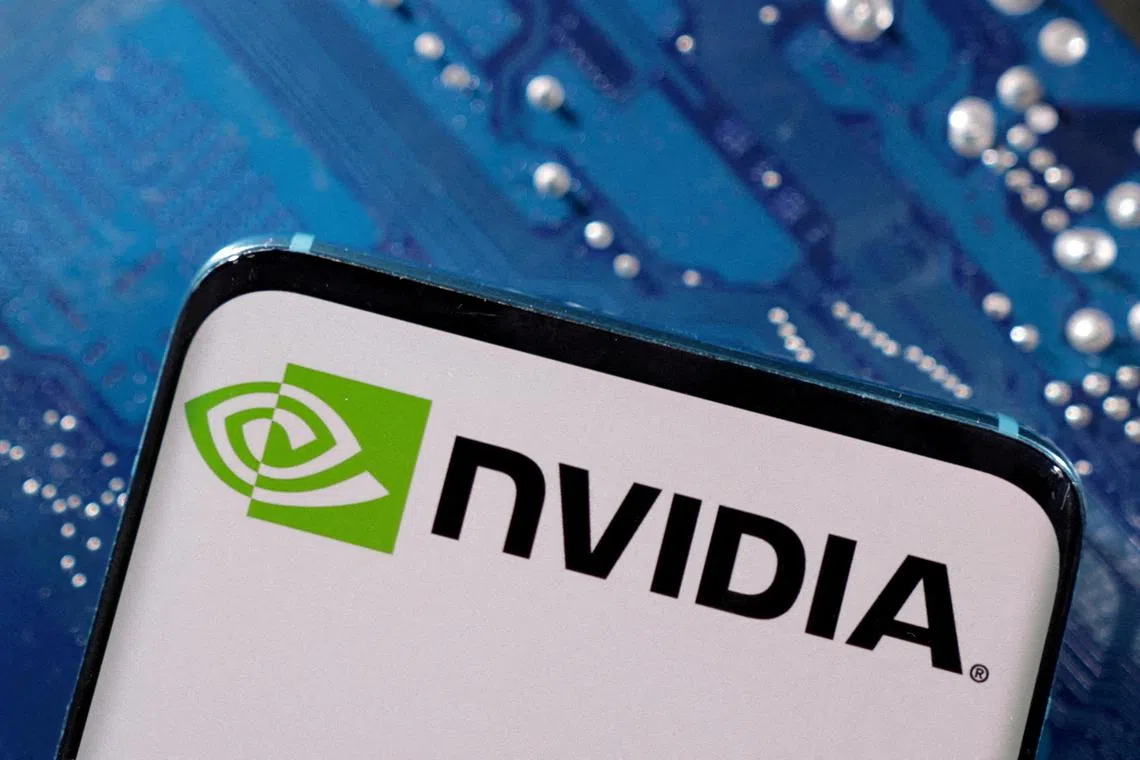China rebukes US over latest chip restrictions
Sign up now: Get ST's newsletters delivered to your inbox

The new measures aim to hamper Beijing’s military development by closing loopholes in regulations that allowed Nvidia and others to ship some chips to China.
PHOTO: REUTERS
WASHINGTON - China has lodged a stern rebuke of the United States over Washington’s latest chip curbs, China’s Foreign Ministry said on Wednesday.
The move comes after the Biden administration published new measures to further restrict Beijing’s access to cutting-edge technologies.
“Such restrictions and forced decoupling for political purposes violate the principles of the market economy and fair competition,” the ministry said in a response to Reuters’ questions.
It noted that the US has said it does not want to block China’s economic development, and hoped the US will adhere to this “rather than saying one thing and doing another”.
Washington on Tuesday said it plans to halt shipments to China of more advanced artificial intelligence (AI) chips designed by Nvidia and others.
It also restricted a broader swathe of advanced chips and chipmaking tools to a greater number of countries including Iran and Russia, and blacklisted Chinese chip designers Moore Threads and Biren.
Mr Yang Wang, a senior analyst at Counterpoint, said he expected only limited disruption to the Chinese AI industry, given that many companies had been bracing themselves for the curbs and also stockpiling chips.
Still, the impact could be more material over the medium to longer term and could cause the gap between China and global peers in AI to grow in coming years, he added.
Mr Charlie Chai, an analyst at 86Research, said the restrictions would likely further boost the self-sufficiency agenda being pushed by Chinese President Xi Jinping.
The new US measures aim to hamper China’s military development by closing loopholes in regulations released in October 2022 and will probably be updated “at least annually”, according to US Commerce Secretary Gina Raimondo.
The goal is to limit China’s access to “advanced semiconductors that could fuel breakthroughs in artificial intelligence and sophisticated computers that are critical to (Chinese) military applications”, she said, stressing the administration was not seeking to hurt Beijing economically.
The US and China have been locked in a years-long technology war, but the sweeping curbs
China-only chips hit
In a statement following publication of the rules, top AI chip designer Nvidia said it complies with regulations and does not expect “a near-term meaningful impact on our financial results”.
Nvidia has made chips such as the A800 and H800 that walked right up the line of the previous rules to continue selling to China.
AMD, also impacted by the rules, has said it plans a similar strategy.
Nvidia’s business has soared its China-only chips
Nvidia’s A800 and H800 chips will be hit by the new regulations, due to a change in chip parameters aimed at capturing a greater number of chips.
But the rules will exempt most consumer chips used in laptops, smartphones and gaming, though some will be subject to licensing and notification requirements by US officials.
The previous rules imposed a two-pronged test that measured both a chip’s computing performance and its ability to communicate with other chips, an important measure in AI supercomputers where thousands of chips are strung together to chew through huge amounts of data.
Nvidia and Intel created special chips for the Chinese market that retained the powerful computing capabilities, but limited communications speeds to stay inside the previous rules.
The rules released on Tuesday eliminate the communication speed limits and focus on computing performance, which will have the effect of halting sales of Nvidia’s A800 and H800 chips for the China market, according to a senior administration official.
US officials on Tuesday added a new measure to restrict chips that exceed a certain level of “performance density”, a measure focused on how much computing power can be packed into a given amount of silicon, a senior administration official said.
The senior administration official said this rule was meant to prevent companies from trying to work around restrictions on full chips by using a technology called “chiplets”, where firms could try to join together small pieces called chiplets into a large chip that violates the rules.
Reuters reported in July that chiplets have become a core part of China’s technology strategy to advance its chip industry, and analysts have said that Chinese companies could use the technology to evade US restrictions.
Licensing expanded
The new measures also expand licensing requirements for exports of advanced chips to more than 40 additional countries that present risks of diversion to China and are subject to US arms embargoes, the officials said.
That measure appears to build on a letter received by Nvidia in August that it described as restricting shipments of its A100 and H100 chips beyond China to other regions including some countries in the Middle East.
Confirming a Reuters report, chips will be barred from being sent to units of firms located anywhere in the world if their parent companies are headquartered in China, Macau and other arms-embargoed countries. The move is part of a bid to keep the chips from being illegally smuggled into China or remotely accessed by Chinese parent companies.
The Biden administration also hit 21 countries outside China with a licensing requirement for chipmaking tools and broadened the list of equipment barred from going to that country. Officials took pains to stress that Chinese officials were warned the rules were coming by Commerce Secretary Raimondo as well as National Security Adviser Jake Sullivan and Treasury Secretary Janet Yellen, confirming a prior Reuters report. REUTERS


